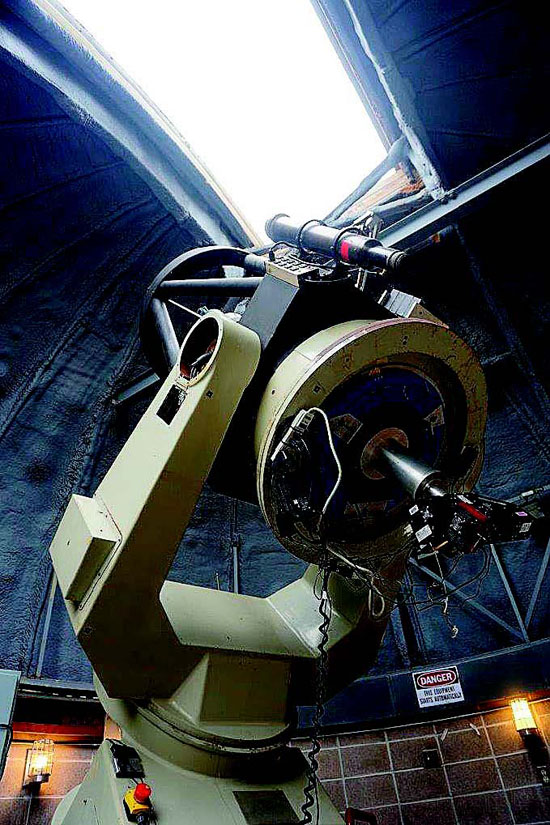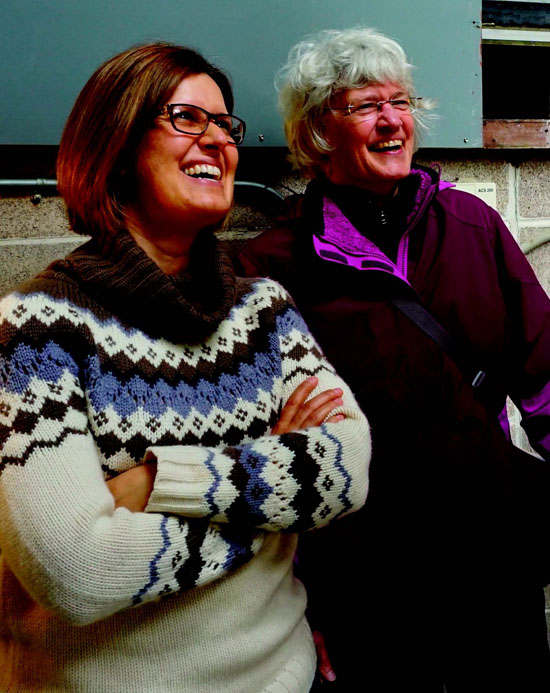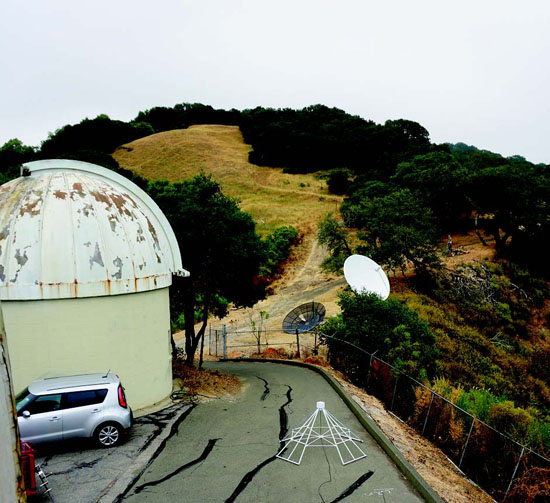 |
|
|
Inside the Leuschner Observatory in Lafayette Photos Cathy Dausman
|
|
|
|
|
|
Many Moraga residents can easily point out the Saint Mary's College hillside observatory. But like a distant star nearly invisible to the naked eye, another observatory sits largely unnoticed among the hills of Lafayette - the Leuschner Observatory that belongs to UC Berkeley.
 The Leuschner site, adjacent to Briones Regional Park and East Bay Municipal Utility District watershed land, is comprised of two domed buildings. The first holds a 30-inch optical telescope used by astronomy students from UC Berkeley and San Francisco State University. The smaller domed building housing a 20-inch telescope is currently off limits to human occupancy because of its rodent population. "We haven't been in there for decades," said UC Berkeley Astronomy Department Chair Imke de Pater.
The Leuschner site, adjacent to Briones Regional Park and East Bay Municipal Utility District watershed land, is comprised of two domed buildings. The first holds a 30-inch optical telescope used by astronomy students from UC Berkeley and San Francisco State University. The smaller domed building housing a 20-inch telescope is currently off limits to human occupancy because of its rodent population. "We haven't been in there for decades," said UC Berkeley Astronomy Department Chair Imke de Pater.
 As rough around the edges as it presently is, Leuschner is still a far sight better than what Cal astronomy students used to rely on. In 1936, the only practical student lab was a small dome atop UC's Campbell Hall. But Campbell Hall's "students' observatory," as it was then called, wasn't cutting it - there was simply too much light and radio wave interference in an urban location.
As rough around the edges as it presently is, Leuschner is still a far sight better than what Cal astronomy students used to rely on. In 1936, the only practical student lab was a small dome atop UC's Campbell Hall. But Campbell Hall's "students' observatory," as it was then called, wasn't cutting it - there was simply too much light and radio wave interference in an urban location.
 In the early 1960s the Russell family deeded a 283-acre parcel of Lafayette land to Berkeley's College of Natural Resources. It was named the Russell Research Station and was to be used for wild land and forestry research. Within the acreage was a 900-plus-foot hilltop above the fog line and away from light pollution - a far better site for an observatory. The university constructed two domed buildings there and named the off-campus student observatory Leuschner in honor of 1950s astronomy department director Armin Leuschner.
In the early 1960s the Russell family deeded a 283-acre parcel of Lafayette land to Berkeley's College of Natural Resources. It was named the Russell Research Station and was to be used for wild land and forestry research. Within the acreage was a 900-plus-foot hilltop above the fog line and away from light pollution - a far better site for an observatory. The university constructed two domed buildings there and named the off-campus student observatory Leuschner in honor of 1950s astronomy department director Armin Leuschner.
 This spring a photo taken inside the larger dome earned Leuschner Observatory a bit of notoriety and architect and curator Carol Reif an award in Lafayette's "Day in the Life" contest. There is a long list of shortcomings and repairs necessary to bring the facility up to useful standards, de Pater admits. The entry road is crumbling and the building housing the smaller dome and 20-inch scope needs work. The larger dome doors don't always close completely, leaving optical and electronic equipment vulnerable to exposure from the elements. There is no potable water on site. Still de Pater hopes her department will rework, rebuild and remodel.
This spring a photo taken inside the larger dome earned Leuschner Observatory a bit of notoriety and architect and curator Carol Reif an award in Lafayette's "Day in the Life" contest. There is a long list of shortcomings and repairs necessary to bring the facility up to useful standards, de Pater admits. The entry road is crumbling and the building housing the smaller dome and 20-inch scope needs work. The larger dome doors don't always close completely, leaving optical and electronic equipment vulnerable to exposure from the elements. There is no potable water on site. Still de Pater hopes her department will rework, rebuild and remodel.
 She talks about long-term repairs completed in phases, beginning with new observatory drawings that might be completed by 2016. If that falls into place, construction could begin in early 2017. All of this depends on finances. By de Pater's estimate it would take thousands of dollars to complete the design work and several hundred thousand dollars for building reconstruction. It is almost certain the university would have to fundraise a considerable amount of those sums.
She talks about long-term repairs completed in phases, beginning with new observatory drawings that might be completed by 2016. If that falls into place, construction could begin in early 2017. All of this depends on finances. By de Pater's estimate it would take thousands of dollars to complete the design work and several hundred thousand dollars for building reconstruction. It is almost certain the university would have to fundraise a considerable amount of those sums.
 "That is likely the case," agreed department manager Lochland Trotter. She envisions the work done in three phases: first, have the department commit to continuing upgrades and return Leuschner to a more prominent resource for the department; second, map serious construction work and upgrades; and last, work with the college to secure funds, likely via campaigns pursuing larger donations. "There would obviously need to be many more groups involved if things continue to move in this direction," Trotter said. In spite of its shortcomings, Leuschner today remains an active teaching facility; it is a site where both undergraduate students and master's candidates can perform their astronomy research. Leuschner's 30-inch telescope can be remotely operated and is still being used to search for meteors. A modular antenna set up in the parking lot looks for evidence of life from a cosmic dawn scientists say happened 13 billion years ago.
"That is likely the case," agreed department manager Lochland Trotter. She envisions the work done in three phases: first, have the department commit to continuing upgrades and return Leuschner to a more prominent resource for the department; second, map serious construction work and upgrades; and last, work with the college to secure funds, likely via campaigns pursuing larger donations. "There would obviously need to be many more groups involved if things continue to move in this direction," Trotter said. In spite of its shortcomings, Leuschner today remains an active teaching facility; it is a site where both undergraduate students and master's candidates can perform their astronomy research. Leuschner's 30-inch telescope can be remotely operated and is still being used to search for meteors. A modular antenna set up in the parking lot looks for evidence of life from a cosmic dawn scientists say happened 13 billion years ago.
 In 1995 the Berkeley Seismological Laboratory began operating a remote sensing station on nearby Russell land. The Leuschner site can even be used in the Search for Extra Terrestrial Intelligence.
In 1995 the Berkeley Seismological Laboratory began operating a remote sensing station on nearby Russell land. The Leuschner site can even be used in the Search for Extra Terrestrial Intelligence.
 "Every campus needs something like this," said Allan Palmer, UC Berkeley project manager of construction and design. Palmer remembers going with his family when he was young to cut Christmas trees around the station's land.
"Every campus needs something like this," said Allan Palmer, UC Berkeley project manager of construction and design. Palmer remembers going with his family when he was young to cut Christmas trees around the station's land.
 Trotter calls Leuschner Observatory a valuable "hands-on experience." Better yet, it is one that is "right in a lot of peoples' backyards," she said. You just have to know where to look.
Trotter calls Leuschner Observatory a valuable "hands-on experience." Better yet, it is one that is "right in a lot of peoples' backyards," she said. You just have to know where to look.

|


